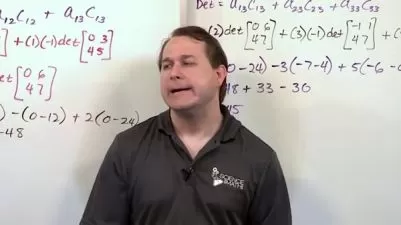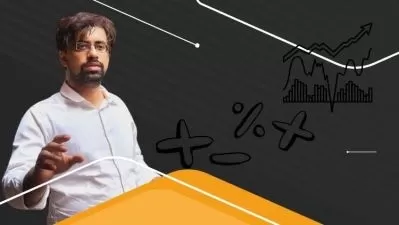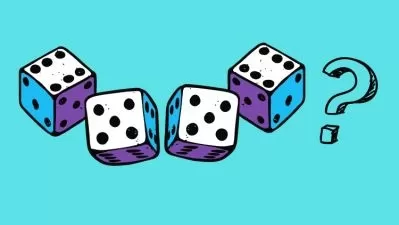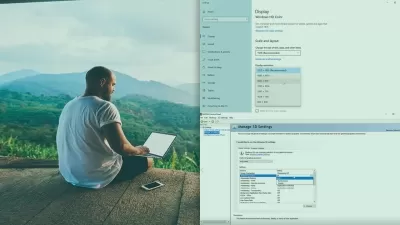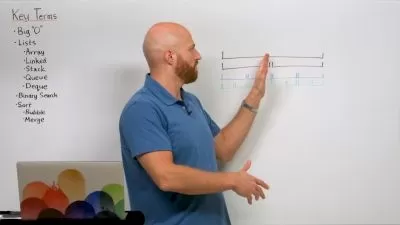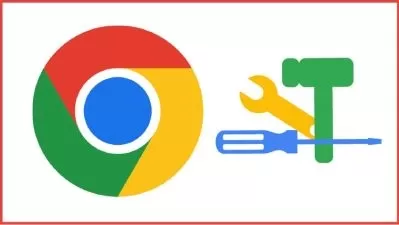Advanced Math for Computer Science Mastery
Stefan Toshkov Zhelyazkov
7:08:11
Description
From Basics to Advanced Operations
What You'll Learn?
- Explore fundamental proof techniques such as mathematical induction and recursion theory to establish the validity of mathematical propositions.
- Delve into the realm of mathematical logic, encompassing propositional and first-order calculus, and gain insights into the Model Theorem.
- Grasp the essential principles of program verification and model checking to ensure the correctness and reliability of computer programs.
- Uncover the significance of linear algebra and matrix theory in the context of computer science, offering powerful tools for various applications.
- Examine Boolean algebra and its practical applications in digital electronics, playing a pivotal role in digital circuit design.
- Investigate Lambda Calculus as the foundational concept of functional programming, enabling the creation of elegant and efficient software solutions.
- Explore the world of number theory and its vital role in encryption methods, safeguarding sensitive information in the digital age.
- Embrace modern statistics and probabilistic methods in computer science, offering powerful tools for data analysis, machine learning, and decision-making.
- Gain a deep understanding of functional analysis and its relevance to the efficiency of computer algorithms, optimizing computational processes.
- Dive into decision theory to make informed choices and maximize the benefits of computer systems and applications.
Who is this for?
What You Need to Know?
More details
DescriptionThis course comprehensively addresses the mathematical foundations essential for aspiring software developers. It delves into a diverse range of mathematical concepts, including Linear Algebra, Modern Analysis, Mathematical Logic, Number Theory, and Discrete Mathematics. Upon completing this course, you will possess the skills to scrutinize and elucidate principles and techniques within the realm of computer science. It offers a remarkable opportunity to acquire a profound grasp of the intricate workings of computer systems during programming. The specific objectives of the course encompass the following:
Master the art of applying proof techniques to your computer programs.
Gain proficiency in encrypting and decrypting messages through Number Theory.
Explore the interconnectedness of software development with Discrete Mathematics and Digital Electronics.
Develop a keen aptitude for utilizing mathematical tools to adeptly analyse any computer algorithm.
Harness the power of Calculus, Probability Theory, and Linear Algebra in computational tasks.
Grasp the application of Lambda Calculus in the realm of Functional Programming.
Discrete mathematics, in essence, centres around the study of mathematical structures that exhibit a fundamental discreteness rather than continuity. Unlike real numbers, which exhibit smooth variations, discrete mathematics revolves around entities like integers, graphs, and logical statements, which do not exhibit such smooth transitions but instead feature distinct and separated values. Consequently, discrete mathematics excludes topics encompassed by "continuous mathematics," such as calculus or Euclidean geometry. Discrete objects are often countable through integers. To succinctly put it, discrete mathematics focuses on countable sets, which may include finite sets or sets with a cardinality analogous to the natural numbers. Nonetheless, the term "discrete mathematics" lacks a precise definition and is more accurately characterized by what it omits, specifically the domain of continuously varying quantities and related concepts.
Who this course is for:
- Computer Science Enthusiasts
- Aspiring Programmers
- Mathematics Enthusiasts
- Students
This course comprehensively addresses the mathematical foundations essential for aspiring software developers. It delves into a diverse range of mathematical concepts, including Linear Algebra, Modern Analysis, Mathematical Logic, Number Theory, and Discrete Mathematics. Upon completing this course, you will possess the skills to scrutinize and elucidate principles and techniques within the realm of computer science. It offers a remarkable opportunity to acquire a profound grasp of the intricate workings of computer systems during programming. The specific objectives of the course encompass the following:
Master the art of applying proof techniques to your computer programs.
Gain proficiency in encrypting and decrypting messages through Number Theory.
Explore the interconnectedness of software development with Discrete Mathematics and Digital Electronics.
Develop a keen aptitude for utilizing mathematical tools to adeptly analyse any computer algorithm.
Harness the power of Calculus, Probability Theory, and Linear Algebra in computational tasks.
Grasp the application of Lambda Calculus in the realm of Functional Programming.
Discrete mathematics, in essence, centres around the study of mathematical structures that exhibit a fundamental discreteness rather than continuity. Unlike real numbers, which exhibit smooth variations, discrete mathematics revolves around entities like integers, graphs, and logical statements, which do not exhibit such smooth transitions but instead feature distinct and separated values. Consequently, discrete mathematics excludes topics encompassed by "continuous mathematics," such as calculus or Euclidean geometry. Discrete objects are often countable through integers. To succinctly put it, discrete mathematics focuses on countable sets, which may include finite sets or sets with a cardinality analogous to the natural numbers. Nonetheless, the term "discrete mathematics" lacks a precise definition and is more accurately characterized by what it omits, specifically the domain of continuously varying quantities and related concepts.
Who this course is for:
- Computer Science Enthusiasts
- Aspiring Programmers
- Mathematics Enthusiasts
- Students
User Reviews
Rating
Stefan Toshkov Zhelyazkov
Instructor's Courses
Udemy
View courses Udemy- language english
- Training sessions 51
- duration 7:08:11
- Release Date 2023/12/12






